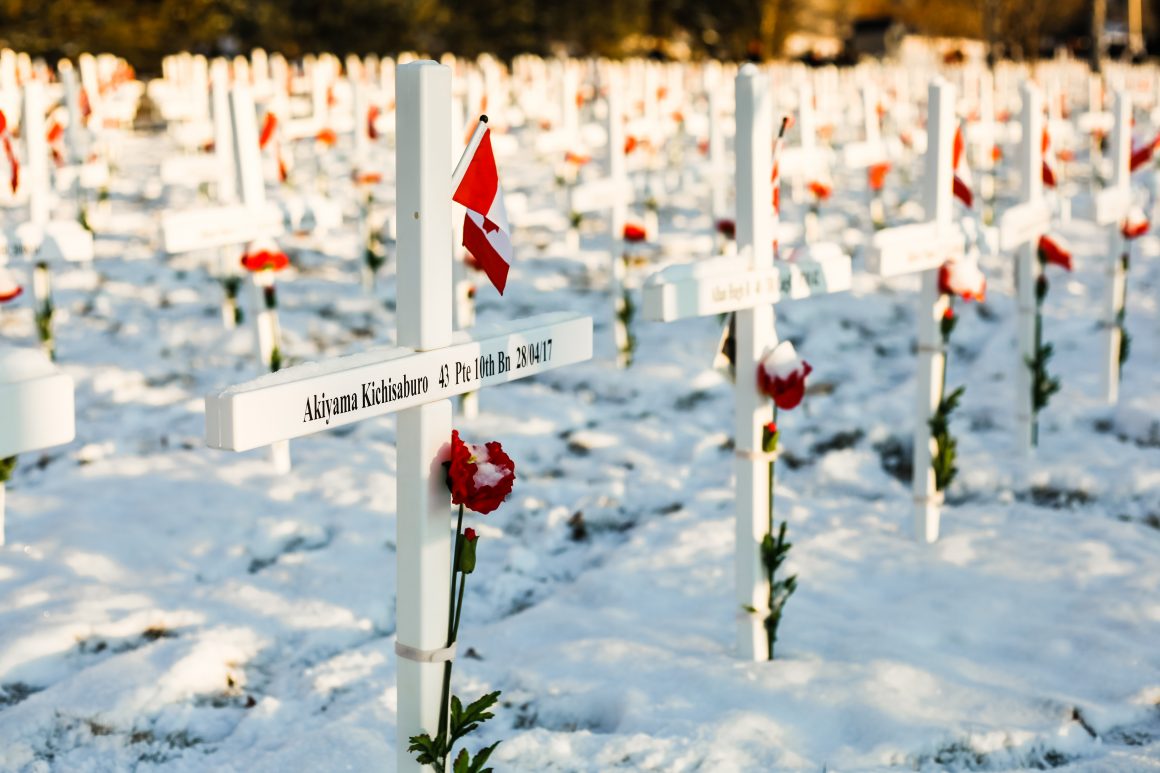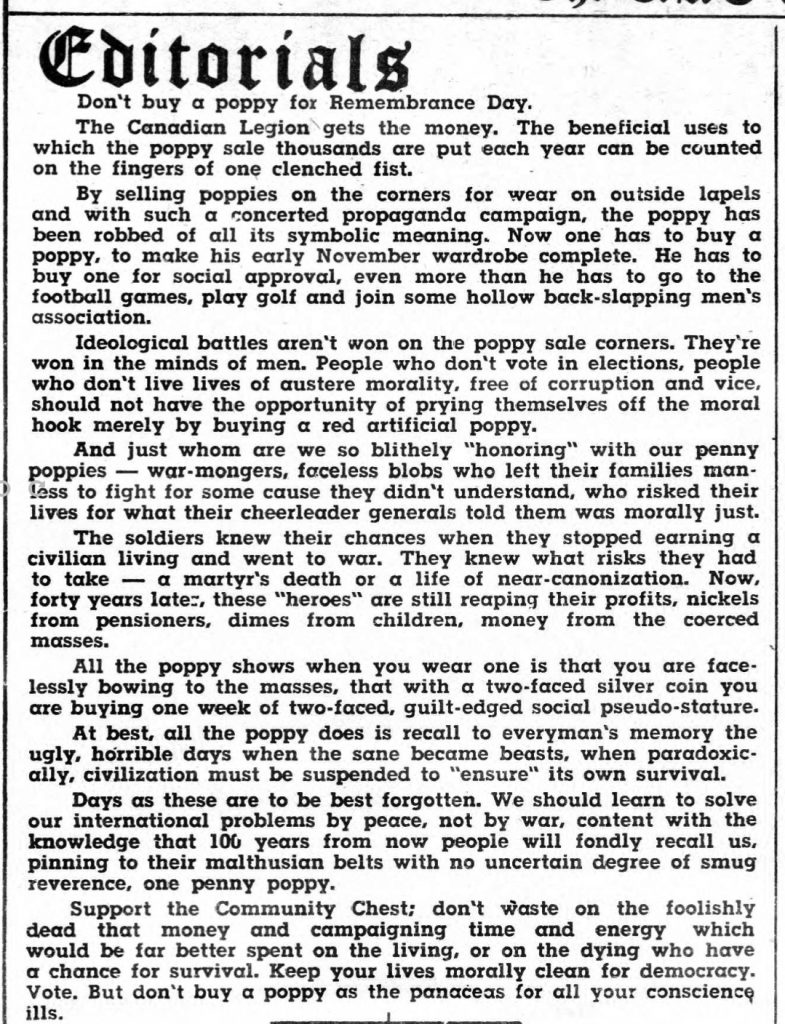
Make love, not war: Historical and present conversations around Remembrance Day
By Nikayla Goddard, November 11 2019 —
Remembrance Day is a holiday many people are patriotic and passionate about — there is no denying how important it is to remember those who have fought and fallen for the many rights Canadians have the privilege to hold today. But from the ceremonies that celebrate our veterans and soldiers to the ways that people honour them, there always seems to be a new controversy surrounding Remembrance Day.
Remembrance Day and its natural association with violence and conflict is historically steeped in protest movements, particularly the counter-war peace movements of the ‘60s during the height of the bloody Vietnam War. The ‘60s were a time where anti-capitalist movements were on the rise, spurred in part by the view that soldiers were treated as commodities to be expended by higher powers. The phrase ‘Make love, not war,’ is strung together from these associations: anti-war and anti-capitalist free love.
Controversies around the modern Remembrance Day stem from the introduction of different coloured poppies that symbolize the different groups of people who gave their lives for their country. Overlooked groups such as Indigenous, black and LGBTQ+ soldiers are being recognized more for the sacrifices they made despite the discimination against them at the time.
This article is a reflection on Remembrance Day, and the past and present opinions that surround it. Framed around one of the Gauntlet’s most controversial editorials ever published, this article aims to inform and dispel myths and hate around Remembrance Day as a reminder that Remembrance Day is about love, not war.
In our Nov. 11 edition in 1960, Editor-in-Chief Maurice Yacowar published an editorial titled “Don’t buy a poppy for Remembrance Day.” Reading it, it’s easy to envision how people reacted, and it may not surprise you that Yacowar took a three-week leave following this, and was relieved of his position soon thereafter.

Nov. 11, 1960 edition editorial by Maurice Yacowar.
This editorial was a heightened, extreme view of how many felt at the time. Though Yacowar ran an apology statement a few weeks later, and others such as UAC Principal Dr. Malcolm Taylor also printed an apology to those offended, there are some statements that still hold relevance to Remembrance Day conversations today.
The most important thing I think we can take from Yacowar’s opinions piece is the importance of utilizing the poppy as a symbol of Remembrance and not just as another addition to our wardrobe in early November. Yacowar said, “the poppy has been robbed of all its symbolic meaning. Now one has to buy a poppy to make his early November wardrobe complete. He has to buy one for social approval.” Looking at any retail store or website that does commit to Remembrance Day displays over Christmas displays, it’s more often than not an onslaught of cheap mass-produced items for purchase. It’s easy to fall into the trap of buying Remembrance Day goods for the sake of buying them without really considering the meaning of the day. Do you perpetuate the purchasing storm, or do you genuinely take a moment to reflect on what Remembrance Day means? Do you wear your poppy because others are, or do you put thought into the significance of the poppy?
Taking a step into the present, the recent controversy around Remembrance Day is the rainbow poppy and other coloured poppies. To be clear, the controversy these past two weeks around rainbow poppies is actually a hoax. There is no great movement among the LGBTQ+ community to take over the traditional poppy with a glittery rainbow one, however, if people do want to wear a rainbow poppy, they have every right to. Alternative poppies have been made and worn for decades, such as beaded poppies for Indigenous soldiers, black poppies for black soldiers, rainbow poppies for LGBTQ+ soldiers and even purple poppies for animals who served. The original red poppy symbolizes the flowers that grew in Flanders Fields, and many feel that in order to honour the fallen soldiers they should stay red.
One of the things that those soldiers fought for — soldiers that included Indigenous, black and LBGTQ+ people — was freedom of speech. During a day of remembrance, the last thing we should be doing is arguing over the “proper” way to remember soldiers. There should be no reason for hate against those who are exercising their right to free speech to better honour those soldiers who made sacrifices for a country that held major discrimination against them at the time.
Bridging the gap between past and present, one common reaction to Remembrance Day across the years seems to be that people choose not to partake in it because they did not know anyone who died in conflict, and therefore feel it’s not relevant to them. But honouring veterans represents the fight for our rights, democracy and freedom of speech. Looking beyond November 11, the main way that we can preserve our Canadian identities and honour those who fought for us to have these rights is to exercise those rights. As Yacowar said, “People who don’t vote in elections, people who don’t live lives of austere morality, free of corruption and vice, should not have the opportunity of prying themselves off the moral hook merely by buying a red artificial poppy.” Sometimes wearing a poppy isn’t enough. Remembrance Day should not be about purchasing, arguing over the colours of poppies or wearing a poppy for the sake of wearing a poppy. Attend a Remembrance Day ceremony, honour friends and family who were or are in service, research history and inform yourself about conflicts or take five minutes while pinning your poppy to reflect on how fortunate we are because of our veterans. Remembrance Day should be about love and remembrance, not war and arguments.
This article is part of our Opinions section and does not necessarily reflect the views of the Gauntlet’s editorial board.
